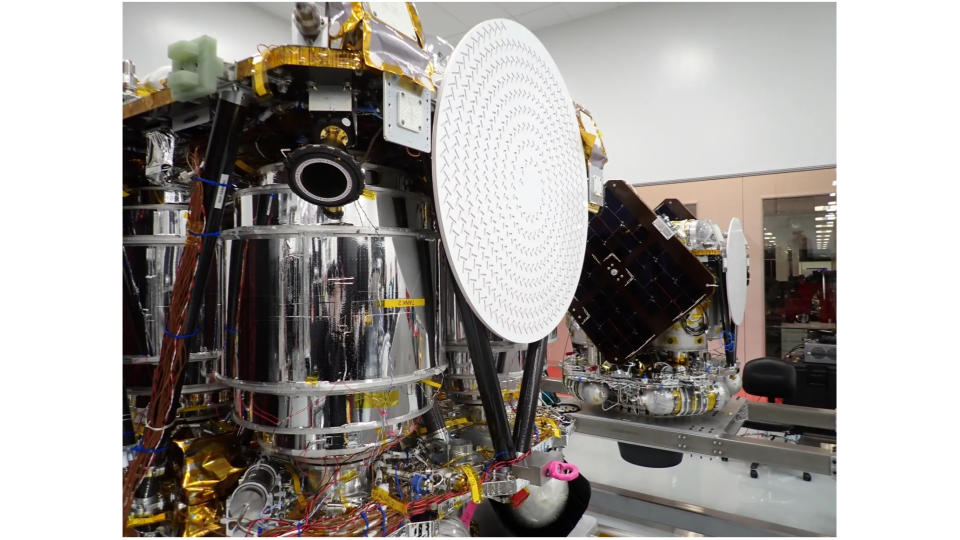When you buy through links in our articles, Future and its syndication partners may earn a commission.

Two small satellites bound for Mars and set to join the long-awaited launch of Blue Origin’s New Glenn rocket have arrived at their launch site in Florida.
The satellite duo, known as ESCAPADE (“Escape and Plasma Acceleration and Dynamics Explorers”), are ready to be launched on New Glenn not before Oct 13 from Cape Canaveral Space Force Station in Florida. They arrive in Mars orbiting Earth in September 2025 on a NASA mission to study how incoming charged particles from the sun interaction with and change the planet’s magnetic environment.
The two coordinated robotic explorers could provide a more detailed picture of how Mars’ interaction with the solar wind affects the planet’s leakage. thin atmosphereand how the climate evolved over time, causing a loss of what scientists believe was once an abundant supply of liquid water on the surface.


On Aug. 18, the twin ESCAPAADE spacecraft arrived at the Astrotech Space Operations Facility in Titusville, Florida, to prepare for launch. At the facility, which is owned by Lockheed Martin, teams will check various aspects of the satellites in a special clean room, including their electrical circuits and possible leaks in their tanks, before performing final assembly.
The spacecraft will be refueled next month, NASA said in a recent report. proposition.
Related: New Glenn: Blue Origin’s Big New Reusable Rocket
“The successful delivery of the spacecraft marks a significant milestone and the culmination of more than three years of dedicated teamwork by individuals across the project,” ESCAPADE Principal Investigator Rob Lillis of the University of California, Berkeley, said in NASA’s statement. “Now we are excited to begin this first step of our journey to Mars!”
The two small satellites were built by the California-based Rocket Lab and UC Berkeley, which is leading the mission and has named the satellites “Blue” and “Gold,” after the school’s traditional colors. Each probe weighs less than 198 pounds (90 kilograms) and carries three science instruments. The total cost of the mission is less than $80 million, according to the mission website.
The value of the launch contract that NASA signed with Blue Origin is $20 million, SpaceNews reported.
ESCAPADE is one of several low-cost, high-risk NASA missions to other planets that typically take more than a decade to develop and cost more than $1 billion. “Sending two spacecraft to Mars for a total of $80 million is simply unheard of, but current NASA leadership is taking the risk,” Lillis said in a previous press release. “Instead of spending $800 million for a 95% chance of success, can we spend $80 million for an 80% chance? That’s what NASA is trying to find out with these missions, and we’re lucky to be one of the guinea pigs.”
The satellites were initially scheduled to hitch a ride on the same SpaceX Falcon Heavy rocket that was scheduled to launch the Psyche asteroid mission in August 2022. were removedbut after delays in the Psyche mission, this resulted in a new orbit that did not allow ESCAPADE to land on Mars. (Psyche ended successfully launch in October 2023.) The satellite duo then the primary charge was aboard Blue Origin’s first orbital rocket, New Glenna two-stage, high-lift rocket named after a NASA astronaut John Glennwho in 1962 became the first American to orbit the Earth.
New Glenn is 322 feet (98 meters) tall, about the height of a 30-story building, and can launch about 45 tons into low Earth orbit. The first flight will come after more than a decade of development by Blue Originwhich was founded by the CEO of Amazon Jeff Bezosand more three years later than the company had hoped.
RELATED STORIES:
— See how Blue Origin’s new Glenn rocket is being built at the space factory on the Florida coast (photo)
— Blue Origin video shows updated design of massive New Glenn rocket
— Mars: Everything You Need to Know About the Red Planet
Once the ESCAPADE satellites reach Mars in September 2025, “the mission team will need several months to set up their orbits for science observations,” NASA said in the recent press release. Their orbits will be adjusted over several months so that by early 2026, they will be following each other in a “string of pearls” formation, allowing them to gather data on Mars’ rapidly changing response to the solar wind.
They will later break into different orbits so they can observe both the solar wind and the upper atmosphere of Mars in real time, the space agency said. The science mission is designed to remain in orbit around Mars for 11 months, until March 2027.
Meanwhile, New Glenn’s first stage is expected to return to Earth shortly after launch, demonstrating its reusability. Blue Origin has said that the first stage will function like a commercial passenger aircraft, but with cleaner fuel, resulting in less waste and lower launch costs.
In recent weeks, parts of other New Glenn rockets scheduled for future flights have been damaged, Bloomberg reported on Aug. 21. In one incident, the top of Blue Origin’s second New Glenn rocket crumpled “like a crushed can of Coca-Cola,” partly due to the error of factory workers who moved the section to a refrigerated storage shed but failed to check the hardware afterward. In the second incident, a component on the third New Glenn rocket failed during stress testing and exploded in a building.
According to Bloomberg, which first reported the recent failures, no injuries were reported in either incident. The problems did not affect New Glenn’s planned debut launch in October, a Blue Origin spokesperson said Alan Boyle of GeekWire.